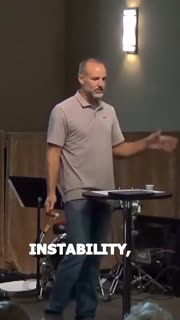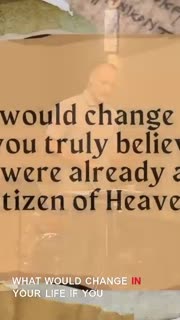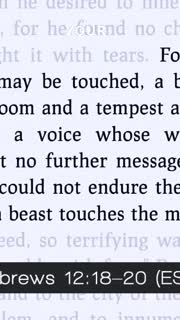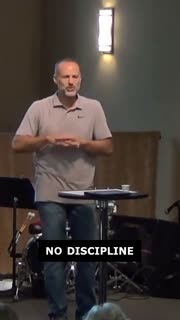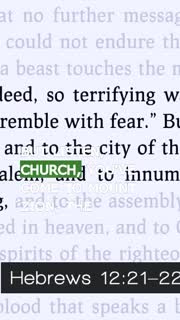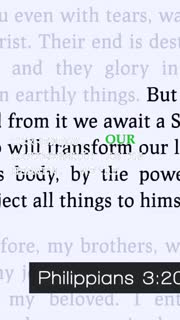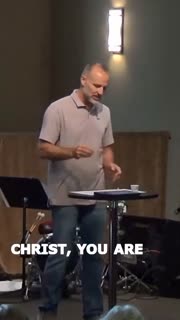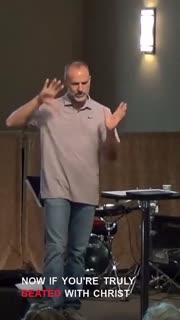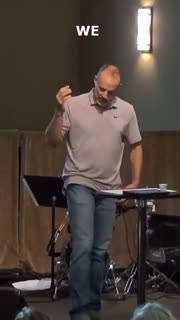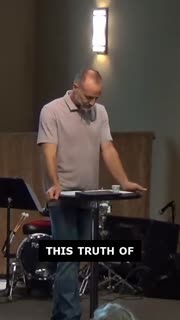Living as Citizens of the Heavenly Kingdom
Devotional
Sermon Summary
Bible Study Guide
Sermon Clips
1. "We all have moments of instability, disruption, fear, ridiculous, right? We could go around and tell those stories, and we all have them. But we belong to a city, and it's described in this passage, as we close out, Hebrews chapter 12, as the new Jerusalem. It's different than the other one. It's new. We've got it, and it's going to come down from heaven, the new Jerusalem, and it's going to be in our midst. And we are already citizens of that place." [03:13] (37 seconds)
2. "What would change in your life if you truly believed you were already a citizen of heaven? I love being a part of Issaquah. I mean, I can't afford to live in Issaquah, let's just be honest. But I love the city center. I love being a part of it. I love being at Culture Fest this Friday night, and serving backstage, and meeting all the people, and working alongside staff members. And the city, and getting to know them, and doing all that. I love this city." [04:10] (27 seconds)
3. "You've got to maintain your believing loyalty in Jesus. Because I know, I know it's tough, and I know there's suffering, and I know there's difficulty. But you've got to hang on to Jesus. There's been all sorts of interesting and scary warning passages in Hebrews. It's been very challenging, but it all comes down to, to listen, listen. You've got to stick together, you've got to love each other, you've got to pour into one another, you've got to live these lives transformed, endure suffering as discipline." [05:07] (30 seconds)
4. "No discipline seems pleasant at the time, but painful, we've heard. But later on, it produces a harvest of righteousness and of peace for those who are trained up under it. And so that, that's why we strengthen our, you know, feeble hands and weak knees, and we say, let's go into this thing. So he says, for, for the reason, the reason why you've come, you've not come to what can be touched. You know, what, what is, what is more real than what you can touch and feel is the kingdom of God." [06:06] (32 seconds)
5. "But listen, church, you've come to Mount Zion, the city of the living God, the heavenly Jerusalem, and to innumerable angels in festal gathering. This is what you've come to. Like, I thought I just came for the coffee and the donuts, the churro bites, you know? I'm like, no, you came to the mountain. This is interesting. Some of you were like, well, which is it? Is it Sinai? Is that the mountain of God or Zion or some, some of you know that even Zaphon, which means the north, the mountain of the north or Jerusalem, Zion, all these, it's wherever God's presence is." [08:31] (36 seconds)
6. "Currently, our citizenship is in heaven. We're citizens. And there's a politic in that city. Our citizenship is there in heaven. Let's read it again as he said it too. The Ephesians. He said, God being rich in mercy because of the great love with which He loved us, even when we were dead in our trespasses, made us alive together with Christ, by grace you've been saved. just make sure you know that. It's a gift. And raised us up with Him and seated us with Him in the heavenly places in Christ Jesus." [14:15] (40 seconds)
7. "If you're in Christ, you are part of new creation. If anyone is in Christ, new creation. This is the part we play. It's not just later. It's happening even now. This is something that has to shift in our thinking. We're already seated. Our identity is rooted in Christ's victory and his authority. And it's all a gift. That's grace. It's just all a gift. We live on earth. And we're here doing the good works that God has called us to do. And he's prepared in advance that we should do. And we're citizens of heaven that is coming." [16:42] (43 seconds)
8. "If you were truly seated with Christ reigning with him in victory, how would that change your decisions? We hear this word you know whether whatever you do whether you eat or drink or work or sleep or play do it all in the name of the lord jesus christ giving glory to god the father through him right that's a that's a pretty familiar concept to do all in the name of jesus right that yes no you've never heard that before so to do something in jesus name what does that what would that imply that means that he's kind of commissioning this activity and i'm doing it in his name." [21:16] (38 seconds)
9. "We live in an unstable, shakable, terrifying, sometimes, world and yet we have this other position in heaven where we just celebrate with God. And so if you ever feel like, what's wrong with me? Why am I happy and just excited about Jesus and terribly sad at the same time? Why is that happening? It's because you're kind of in both places. You're in both places. You're experiencing, you're bringing your addictions, you're bringing your struggles, you're bringing all the problems to Jesus and you're celebrating with him at the same time. You've been invited to a great party." [40:50] (40 seconds)
10. "This truth of being a citizen of the new creation, the new heaven is not just about our future. We're here in the present and living out our identity. And we're supposed to bring those, into a taste of the kingdom. Imitate me. Go with me. We're not supposed to be proud that we somehow were amazingly gifted salvation. We're supposed to be like one beggar telling another beggar where we can go find bread. So you're like, well, who am I to invite someone to encounter Jesus? Like, well, if you've encountered Jesus, you just say, here. I don't know. I don't know actually the whole story. I'm still learning. But all I know is I was blind, but now I see." [44:10] (50 seconds)
Ask a question about this sermon
2. "What would change in your life if you truly believed you were already a citizen of heaven? I love being a part of Issaquah. I mean, I can't afford to live in Issaquah, let's just be honest. But I love the city center. I love being a part of it. I love being at Culture Fest this Friday night, and serving backstage, and meeting all the people, and working alongside staff members. And the city, and getting to know them, and doing all that. I love this city." [04:10] (27 seconds)
3. "You've got to maintain your believing loyalty in Jesus. Because I know, I know it's tough, and I know there's suffering, and I know there's difficulty. But you've got to hang on to Jesus. There's been all sorts of interesting and scary warning passages in Hebrews. It's been very challenging, but it all comes down to, to listen, listen. You've got to stick together, you've got to love each other, you've got to pour into one another, you've got to live these lives transformed, endure suffering as discipline." [05:07] (30 seconds)
4. "No discipline seems pleasant at the time, but painful, we've heard. But later on, it produces a harvest of righteousness and of peace for those who are trained up under it. And so that, that's why we strengthen our, you know, feeble hands and weak knees, and we say, let's go into this thing. So he says, for, for the reason, the reason why you've come, you've not come to what can be touched. You know, what, what is, what is more real than what you can touch and feel is the kingdom of God." [06:06] (32 seconds)
5. "But listen, church, you've come to Mount Zion, the city of the living God, the heavenly Jerusalem, and to innumerable angels in festal gathering. This is what you've come to. Like, I thought I just came for the coffee and the donuts, the churro bites, you know? I'm like, no, you came to the mountain. This is interesting. Some of you were like, well, which is it? Is it Sinai? Is that the mountain of God or Zion or some, some of you know that even Zaphon, which means the north, the mountain of the north or Jerusalem, Zion, all these, it's wherever God's presence is." [08:31] (36 seconds)
6. "Currently, our citizenship is in heaven. We're citizens. And there's a politic in that city. Our citizenship is there in heaven. Let's read it again as he said it too. The Ephesians. He said, God being rich in mercy because of the great love with which He loved us, even when we were dead in our trespasses, made us alive together with Christ, by grace you've been saved. just make sure you know that. It's a gift. And raised us up with Him and seated us with Him in the heavenly places in Christ Jesus." [14:15] (40 seconds)
7. "If you're in Christ, you are part of new creation. If anyone is in Christ, new creation. This is the part we play. It's not just later. It's happening even now. This is something that has to shift in our thinking. We're already seated. Our identity is rooted in Christ's victory and his authority. And it's all a gift. That's grace. It's just all a gift. We live on earth. And we're here doing the good works that God has called us to do. And he's prepared in advance that we should do. And we're citizens of heaven that is coming." [16:42] (43 seconds)
8. "If you were truly seated with Christ reigning with him in victory, how would that change your decisions? We hear this word you know whether whatever you do whether you eat or drink or work or sleep or play do it all in the name of the lord jesus christ giving glory to god the father through him right that's a that's a pretty familiar concept to do all in the name of jesus right that yes no you've never heard that before so to do something in jesus name what does that what would that imply that means that he's kind of commissioning this activity and i'm doing it in his name." [21:16] (38 seconds)
9. "We live in an unstable, shakable, terrifying, sometimes, world and yet we have this other position in heaven where we just celebrate with God. And so if you ever feel like, what's wrong with me? Why am I happy and just excited about Jesus and terribly sad at the same time? Why is that happening? It's because you're kind of in both places. You're in both places. You're experiencing, you're bringing your addictions, you're bringing your struggles, you're bringing all the problems to Jesus and you're celebrating with him at the same time. You've been invited to a great party." [40:50] (40 seconds)
10. "This truth of being a citizen of the new creation, the new heaven is not just about our future. We're here in the present and living out our identity. And we're supposed to bring those, into a taste of the kingdom. Imitate me. Go with me. We're not supposed to be proud that we somehow were amazingly gifted salvation. We're supposed to be like one beggar telling another beggar where we can go find bread. So you're like, well, who am I to invite someone to encounter Jesus? Like, well, if you've encountered Jesus, you just say, here. I don't know. I don't know actually the whole story. I'm still learning. But all I know is I was blind, but now I see." [44:10] (50 seconds)
